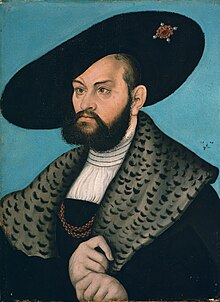هر آنچه پروردگارم اراده کند، آن خواهد شد
| هر آنچه پروردگارم اراده کند، آن خواهد شد | |
|---|---|
| سرود روحانی لوتریان | |
 پرترهای از آلبرت، دوک پروس اثر لوکاس کراناخ پدر | |
| شمارهٔ اثر | شمارهٔ زان ۷۵۶۸[۱] |
| تاریخ نگارش | ۱۵۴۷ |
| سراینده شعر | منسوب به آلبرت، دوک پروس[۲] |
| زبان | آلمانی |
| ملودی | کلودان دو سرمیسی[۳] |
| آفرینش | ۱۵۲۹ |
| منتشر شده | ۱۵۴۷ |
هر آنچه پروردگارم اراده کند، آن خواهد شد (Was mein Gott will, das g'scheh allzeit) یک سرود روحانی لوتریان است که حوالی سال ۱۵۵۰ توسط آلبرت، دوک پروس نگاشته شد. ملودی این سرود روحانی الهامگرفته از ترانهای قدیمیتر اثر کلودان دو سرمیسی در سال ۱۵۲۹ است.
یوهان سباستیان باخ از این سروده در انجیل به روایت متی استفاده کرد.[۳][۴]
![<< <<
\new Staff { \clef treble \time 4/4 \partial 4 \key d \major \set Staff.midiInstrument = "church organ" \relative c'
\repeat unfold 2 { << {
\set Score.tempoHideNote = ##t \override Score.BarNumber #'transparent = ##t
fis8 g | a4 b a d | d cis d\fermata d | cis b e d8 cis | cis2 b4\fermata \bar "||" \break } \\
{ d,4 | d d d d8 e | fis g a4 a gis | a4 g!8 a b4 b | b( ais) fis }
>> }
\relative d''
<< { b4 | b b cis8 b a4 | a gis a\fermata a | b cis d cis | b2 cis4\fermata \break
fis,8 g | a4 b a d | d cis d\fermata d | cis b e d8 cis | cis2 b4\fermata \bar"|." } \\
{ fis4 | e8 fis gis4 gis fis | fis e e fis | fis8[ e] e[ d] d4 e | e( fis8 eis) fis4
fis4 | fis fis8 eis fis4 fis | e4 fis8 g fis4 fis | e8[ fis] gis[ ais] b4 b | b( ais) fis } >>
}
\new Lyrics \lyricmode {
Was4 mein Gott will, das g'scheh' all -- zeit,
sein Will, der ist der be2 -- ste;4
zu4 hel -- fen den' er ist be -- reit,
die an ihn glau -- ben fe2 -- ste.4
Er4 hilft aus Not, der from -- me Gott,
und züch -- ti -- get mit Mas2 -- sen.4
Wer4 Gott ver -- traut, fest auf ihn baut,
den will er nicht ver -- las2 -- sen.4
}
\new Staff { \clef bass \key d \major \set Staff.midiInstrument = "church organ" \relative c'
\repeat unfold 2 { << { b4 | a g fis8[ g] a[ b] | a4 e' fis e8 d | e fis g4 g fis | g( fis8 e) d4 } \\
{ b4 | fis g d8[ e] fis[ g] | a4 a, d b | a e'8[ fis] g[ a] b4 | e,( fis) b, }
>> }
\relative d'
<< { d8 cis | b4 e8 d cis4 cis | b cis8 d cis4 d | d8[ cis] cis[ b] b[ ais] ais[ g] | fis( b d gis,) ais4
d4 | cis d8 b cis4 d8 cis | b4 a a a8 b | cis dis e4 b8 cis d4 | gis,( cis) dis } \\
{ b8 a | gis fis e4 eis fis8 e | dis4 e a, d | gis, ais b cis | d( b) fis'
b | a gis fis b8 a | gis4 a d, fis8 gis! | a4 gis g fis | eis fis b, } >>
}
>> >>
\layout { indent = #0 }
\midi { \tempo 4 = 80 }](http://upload.wikimedia.org/score/b/e/bex9cybfvkdclwv0dfhvgoyctoqorap/bex9cybf.png)
منابع[ویرایش]
- ↑ Zahn, Johannes (1891). Die Melodien der deutschen evangelischen Kirchenlieder (به آلمانی). Vol. IV. Gütersloh: Bertelsmann. pp. 472–473.
- ↑ "Was mein Gott will, das gscheh allzeit BWV 111; BC A 36 / Chorale cantata (3rd Sunday of Epiphany)". Bach Digital. Retrieved 9 April 2020.
- ↑ ۳٫۰ ۳٫۱ "Chorale Melodies used in Bach's Vocal Works / Was mein Gott will, das g'scheh allzeit". Bach Cantatas Website. 2009. Retrieved 5 April 2020.
- ↑ Terry, Charles Sanford (1915). No. 31.: O Father, let thy will be done (Was mein Gott will). Johann Sebastian Bach, Bach’s Chorals, vol. 1 The Hymns and Hymn Melodies of the “Passions” and Oratorios. oll.libertyfund.org.
| در ویکیانبار پروندههایی دربارهٔ هر آنچه پروردگارم اراده کند، آن خواهد شد موجود است. |
